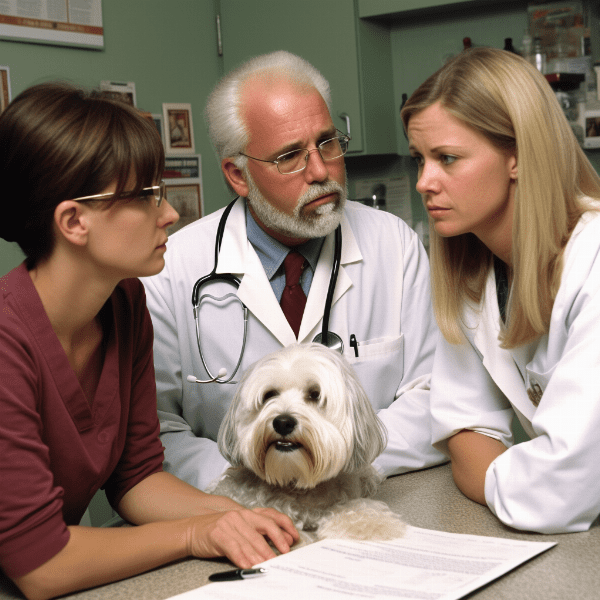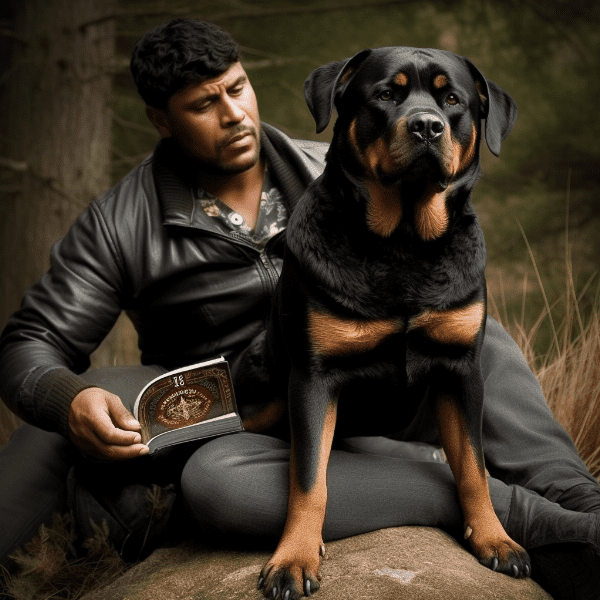Table of Contents
- Understanding Dog Stomach Growling
- Common Causes of Dog Stomach Growling
- When to Be Concerned About Your Dog’s Stomach Growling
- Tips for Managing Dog Stomach Growling at Home
- Best Foods to Soothe Your Dog’s Stomach
- Hydration for Dogs with Stomach Growling
- Exercise and Stomach Growling in Dogs
- Medications for Dog Stomach Growling
- Preventing Dog Stomach Growling in the Future
- When to Consult a Veterinarian for Your Dog’s Stomach Growling.
Understanding Dog Stomach Growling
When it comes to understanding your dog’s health, it’s important to know what their body language is telling you. One such sign of your dog’s discomfort is stomach growling. In this section, we will explore the causes of stomach growling and what it means for your furry friend’s well-being.
How Stomach Growling Works in Dogs
Stomach growling in dogs is caused by the movement of gases and liquids in the digestive tract. This movement, also known as borborygmi, produces a rumbling sound that can be heard on the outside of your dog’s body. Borborygmi can be a normal part of your dog’s digestion, or it can signal an underlying health problem.
Normal vs. Abnormal Stomach Growling
It’s important to differentiate between normal and abnormal stomach growling in dogs. Normal stomach growling occurs during the digestion process when the stomach and intestines are empty. Abnormal stomach growling, on the other hand, can occur even when your dog’s stomach is full, indicating a possible health issue.
Other Causes of Stomach Growling in Dogs
Stomach growling can also be caused by other factors, such as stress and anxiety, infections, gastrointestinal disorders, and food intolerances. Some medications can also cause stomach growling as a side effect. It’s important to pay attention to your dog’s other symptoms and behaviors to determine the underlying cause of stomach growling.
Conclusion
Understanding stomach growling in dogs can help you provide better care for your furry friend. While stomach growling can be a normal part of your dog’s digestion, abnormal stomach growling can signal an underlying health issue. By paying attention to your dog’s symptoms and behaviors, you can determine the cause of stomach growling and seek appropriate treatment if necessary.
Common Causes of Dog Stomach Growling
In the previous section, we discussed how stomach growling works in dogs and what it can indicate. In this section, we will delve deeper into the common causes of stomach growling in dogs.
Hunger and Digestion
As we discussed earlier, hunger is one of the most common causes of stomach growling in dogs. When your dog’s stomach is empty, the digestive tract can produce louder and more frequent borborygmi. Dogs who are on an irregular feeding schedule are more likely to experience stomach growling due to hunger.
Anxiety and Stress
Dogs are highly sensitive creatures and can experience anxiety and stress just like humans. Anxiety and stress can cause stomach growling, as well as other digestive issues, such as diarrhea and vomiting. If your dog is exhibiting signs of anxiety and stress, such as panting, pacing, or whining, it’s important to address the root cause and provide a calm and safe environment for your pet.
Gastrointestinal Disorders
Stomach growling can also be a sign of gastrointestinal disorders, such as inflammatory bowel disease, pancreatitis, or gastroenteritis. These conditions can cause inflammation and irritation in the digestive tract, leading to stomach growling, vomiting, and diarrhea. If you suspect that your dog may be suffering from a gastrointestinal disorder, it’s important to consult with your veterinarian for proper diagnosis and treatment.
Food Intolerances
Some dogs can be intolerant to certain types of food, such as dairy or wheat, which can cause stomach growling, diarrhea, and other digestive issues. If you suspect that your dog may have a food intolerance, it’s important to switch to a different type of food and monitor your dog’s symptoms.
Medications
Certain medications, such as antibiotics, can cause stomach growling as a side effect. If your dog is on any medication and is experiencing stomach growling, it’s important to consult with your veterinarian to determine if the medication is the cause and if any adjustments need to be made.
Conclusion
Stomach growling in dogs can be caused by a variety of factors, including hunger, anxiety, gastrointestinal disorders, food intolerances, and medications. By understanding the common causes of stomach growling, you can better identify the underlying issue and seek appropriate treatment for your furry friend.
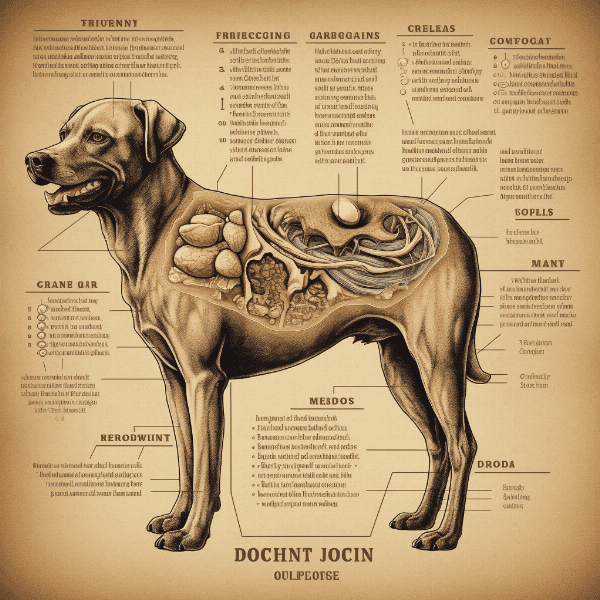
When to Be Concerned About Your Dog’s Stomach Growling
Duration and Frequency of Stomach Growling
Normal stomach growling in dogs is usually short-lived and occurs intermittently. However, if your dog’s stomach growling persists for an extended period or occurs frequently, it may indicate an underlying health issue. If your dog is experiencing persistent or frequent stomach growling, it’s important to consult with your veterinarian.
Other Symptoms
Stomach growling in dogs can be accompanied by other symptoms, such as vomiting, diarrhea, or loss of appetite. If your dog is exhibiting any of these symptoms in addition to stomach growling, it may indicate a more serious health issue, such as gastrointestinal disorders or infections. It’s important to consult with your veterinarian if your dog is exhibiting any of these symptoms.
Behavioral Changes
If your dog is exhibiting behavioral changes, such as lethargy, aggression, or avoidance, in addition to stomach growling, it may indicate pain or discomfort. Dogs may exhibit these behaviors to communicate their discomfort, so it’s important to pay attention to your dog’s behavior and seek veterinary care if necessary.
Preventive Measures
Preventive measures can also help you identify when to be concerned about your dog’s stomach growling. Regular visits to the veterinarian can help catch any underlying health issues early on, while a healthy and balanced diet can reduce the risk of digestive issues. If you suspect that your dog may be experiencing discomfort or pain, it’s important to seek veterinary care immediately.
Conclusion
While stomach growling in dogs is often a normal part of digestion, it’s important to be aware of when it may indicate an underlying health issue. If your dog’s stomach growling persists for an extended period, is accompanied by other symptoms, or is causing behavioral changes, it’s important to seek veterinary care. Preventive measures, such as regular visits to the veterinarian and a healthy diet, can also help identify and prevent health issues related to stomach growling.
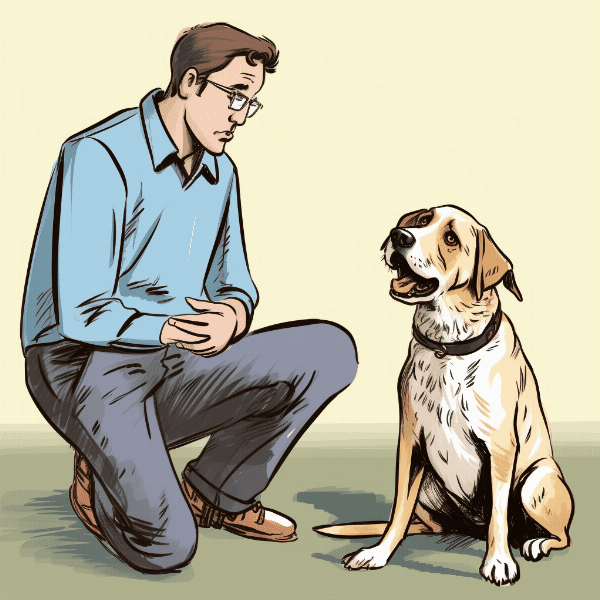
Tips for Managing Dog Stomach Growling at Home
Feed Your Dog a Balanced Diet
A balanced diet is essential for your dog’s overall health and can also help reduce the risk of digestive issues, such as stomach growling. Make sure your dog is getting the appropriate amount of nutrients, vitamins, and minerals in their diet. Consult with your veterinarian for dietary recommendations.
Provide Plenty of Water
Hydration is essential for your dog’s digestive health and can also help reduce the risk of stomach growling. Make sure your dog has access to plenty of clean, fresh water throughout the day.
Conclusion
Managing your dog’s stomach growling at home can be done through a variety of methods, including feeding a balanced diet, providing smaller, frequent meals, ensuring plenty of hydration, reducing stress and anxiety, and regular exercise. By following these tips, you can help reduce the incidence of stomach growling in your furry friend and promote their overall digestive health.
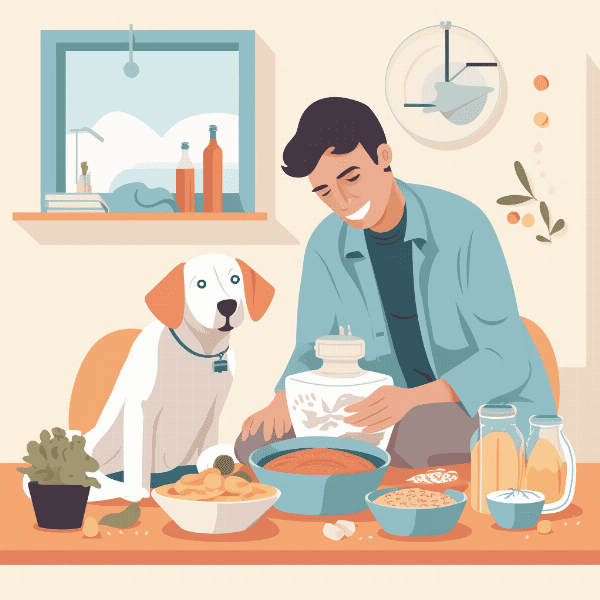
Best Foods to Soothe Your Dog’s Stomach
Boiled Chicken and Rice
Boiled chicken and rice is a common food for dogs with upset stomachs. This bland diet can be easy on your dog’s digestive system and can help reduce inflammation and irritation in the stomach. Make sure the chicken is fully cooked and the rice is thoroughly cooked and cooled before serving.
Pumpkin
Pumpkin is a natural source of fiber and can help regulate your dog’s digestive system. It can also help reduce inflammation and irritation in the stomach. Make sure to use plain, canned pumpkin, not pumpkin pie filling, and give it to your dog in small amounts.
Yogurt
Yogurt is a good source of probiotics, which can help regulate your dog’s digestive system and reduce inflammation. Make sure to choose plain, unsweetened yogurt and avoid any flavored varieties that may contain added sugars or artificial ingredients.
Bone Broth
Bone broth is a nutrient-rich liquid that can help soothe your dog’s stomach and promote overall digestive health. It can also provide hydration and nutrients, such as collagen and amino acids, that can help heal the digestive tract. Make sure to use bone broth that is free of any added seasonings or spices.
Boiled Vegetables
Boiled vegetables, such as carrots, green beans, and sweet potatoes, can be a good source of vitamins and minerals for your dog, while also helping to regulate their digestive system. Make sure to cook the vegetables thoroughly and avoid adding any seasonings or spices that may irritate your dog’s stomach.
Conclusion
When it comes to soothing your dog’s stomach, certain foods can be particularly helpful. Boiled chicken and rice, pumpkin, yogurt, bone broth, and boiled vegetables are all good options to consider. These foods can help reduce inflammation and irritation in the digestive tract, while also providing important nutrients and probiotics that can promote digestive health. If you are unsure about what foods to give your dog or if their stomach issues persist, it’s important to consult with your veterinarian.
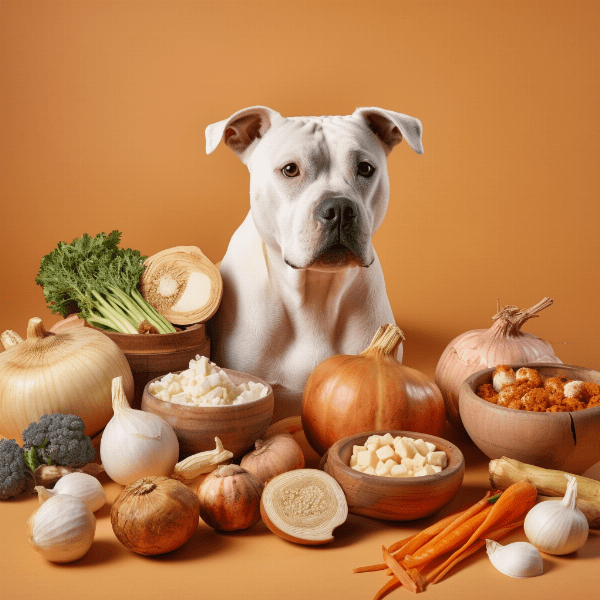
Hydration for Dogs with Stomach Growling
The Importance of Hydration
Hydration is essential for your dog’s overall health, but it is particularly important for dogs with stomach growling. Adequate hydration can help prevent constipation, reduce inflammation in the digestive tract, and promote healthy digestion. Water is the best source of hydration for your dog, and it’s important to make sure your dog has access to plenty of clean, fresh water throughout the day.
Signs of Dehydration
It’s important to be aware of the signs of dehydration in your dog, especially if they are experiencing stomach growling. Some common signs of dehydration in dogs include dry mouth and nose, sunken eyes, lethargy, and loss of appetite. If you notice any of these signs in your dog, it’s important to increase their water intake and seek veterinary care if necessary.
Encouraging Hydration
If your dog is not drinking enough water, there are several ways to encourage them to stay hydrated. Try adding a small amount of low-sodium chicken broth or bone broth to their water bowl to make it more appealing. You can also add a small amount of water to their food to increase their overall water intake.
Conclusion
Hydration is essential for dogs with stomach growling, as it can help prevent constipation, reduce inflammation, and promote healthy digestion. It’s important to make sure your dog has access to plenty of clean, fresh water throughout the day and to be aware of the signs of dehydration. If you notice any signs of dehydration or if your dog is not drinking enough water, there are several ways to encourage them to stay hydrated. If you are concerned about your dog’s hydration levels or overall health, it’s important to consult with your veterinarian.

Exercise and Stomach Growling in Dogs
The Importance of Exercise
Exercise is essential for your dog’s overall health, but it can also play a role in reducing the incidence of stomach growling. Regular exercise can help stimulate your dog’s digestive system and promote healthy digestion, reducing the risk of stomach growling and other digestive issues.
When to Exercise
It’s important to consider the timing of exercise in relation to your dog’s meals, as exercising too soon after eating can increase the risk of stomach growling and other digestive issues. As a general rule, it’s best to wait at least an hour after your dog’s meal before engaging in strenuous exercise.
Types of Exercise
There are many types of exercise that can be beneficial for dogs, including walking, running, playing fetch, and swimming. The type and amount of exercise your dog needs will depend on their age, breed, and overall health. Consult with your veterinarian to determine the appropriate exercise regimen for your furry friend.
Signs of Overexertion
It’s important to be aware of the signs of overexertion in your dog, as excessive exercise can increase the risk of stomach growling and other health issues. Signs of overexertion can include excessive panting, drooling, fatigue, and vomiting. If you notice any of these signs in your dog, it’s important to slow down or stop the exercise and seek veterinary care if necessary.
Conclusion
Exercise is an important aspect of your dog’s overall health, and it can also play a role in reducing the incidence of stomach growling. By providing your dog with regular exercise and being aware of the timing and type of exercise, you can help promote healthy digestion and reduce the risk of digestive issues. If you are unsure about the appropriate exercise regimen for your dog or if they are exhibiting signs of overexertion, it’s important to consult with your veterinarian.
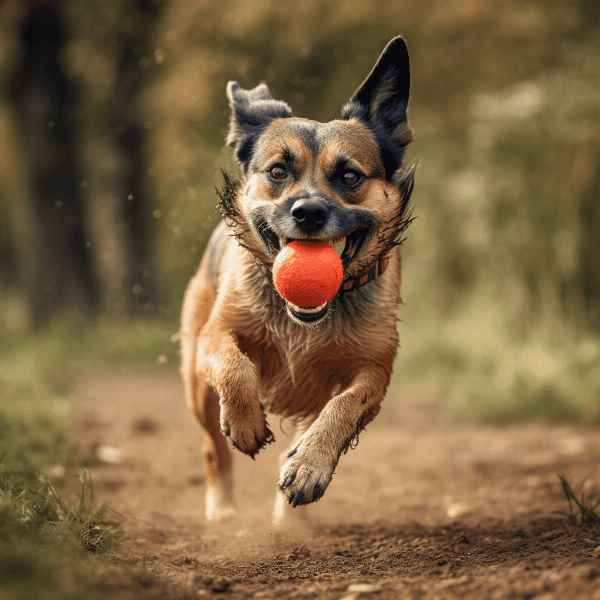
Medications for Dog Stomach Growling
Antacids
Antacids are medications that can help reduce the amount of acid in the stomach, which can be helpful for dogs with acid reflux or other digestive issues that can cause stomach growling. Examples of antacids for dogs include famotidine and omeprazole. However, it’s important to use these medications under the guidance of a veterinarian, as they can have side effects and may not be appropriate for all dogs.
Probiotics
Probiotics are supplements that contain beneficial bacteria that can help regulate the digestive system and reduce inflammation in the digestive tract. Probiotics can be particularly helpful for dogs with stomach growling caused by digestive issues, such as inflammatory bowel disease or bacterial overgrowth. Your veterinarian can recommend the appropriate probiotic supplement for your dog.
Anti-nausea Medications
Anti-nausea medications can be helpful for dogs with stomach growling caused by nausea or vomiting. Examples of anti-nausea medications for dogs include maropitant and metoclopramide. However, these medications should only be used under the guidance of a veterinarian, as they can have side effects and may not be appropriate for all dogs.
Conclusion
While medications may be necessary to manage stomach growling in some dogs, they should only be used under the guidance of a veterinarian. Antacids, probiotics, and anti-nausea medications are some of the medications that may be used to treat stomach growling in dogs, but the appropriate medication and dosage will depend on the underlying cause of the stomach growling and the individual needs of the dog. It’s important to consult with your veterinarian if you are considering medication for your dog’s stomach growling or if their symptoms persist despite home management strategies.
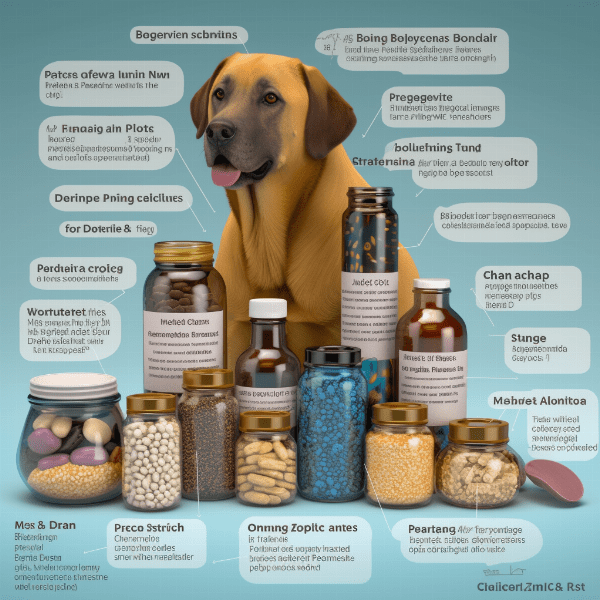
Preventing Dog Stomach Growling in the Future
In the previous sections, we discussed the basics of stomach growling in dogs, its common causes, and how to manage it at home, through dietary changes, hydration, exercise, and medications. In this section, we will explore some strategies for preventing stomach growling in the future.
Feed a Balanced Diet
Feeding your dog a balanced diet is one of the most important things you can do to prevent stomach growling and other digestive issues. Make sure your dog is getting the appropriate amount of nutrients, vitamins, and minerals in their diet, and avoid feeding them foods that are high in fat, salt, or sugar.
Feed Smaller, More Frequent Meals
Feeding your dog smaller, more frequent meals throughout the day can help prevent stomach growling caused by hunger and can also help prevent overeating and reduce the risk of other digestive issues.
Encourage Hydration
Ensuring that your dog has access to plenty of clean, fresh water throughout the day can help prevent constipation, reduce inflammation in the digestive tract, and promote healthy digestion.
Reduce Stress and Anxiety
Stress and anxiety can cause stomach growling in dogs, so it’s important to provide a calm and safe environment for your pet. Avoid exposing your dog to stressful situations whenever possible, and consider using calming aids, such as pheromone sprays or supplements, to help reduce anxiety.
Regular Exercise
Regular exercise can help stimulate your dog’s digestive system and promote healthy digestion, reducing the risk of stomach growling and other digestive issues. Make sure your dog is getting enough exercise every day, and adjust their activity levels based on their age, breed, and overall health.
Conclusion
Preventing stomach growling in dogs requires a combination of dietary changes, hydration, exercise, stress reduction, and other management strategies. By feeding your dog a balanced diet, providing plenty of water, reducing stress and anxiety, and promoting regular exercise, you can help prevent stomach growling and promote overall digestive health. If you are concerned about your dog’s stomach growling or digestive health, it’s important to consult with your veterinarian.
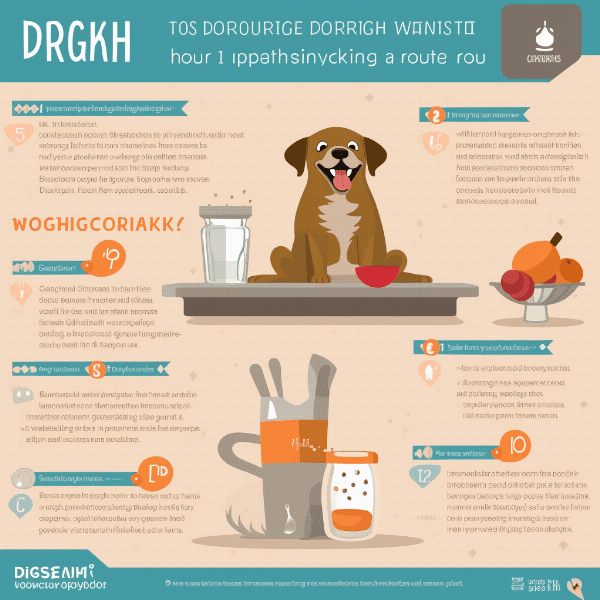
When to Consult a Veterinarian for Your Dog’s Stomach Growling.
In the previous sections, we discussed the basics of stomach growling in dogs, its common causes, and how to manage it at home, through dietary changes, hydration, exercise, medications, and prevention strategies. While many cases of stomach growling in dogs can be managed at home, there are some instances where it’s important to consult with a veterinarian. In this section, we will explore when to seek veterinary care for your dog’s stomach growling.
Persistent or Severe Symptoms
If your dog’s stomach growling persists or is accompanied by other symptoms, such as vomiting, diarrhea, lethargy, or loss of appetite, it’s important to seek veterinary care. These symptoms can be indicative of more serious underlying health issues, such as inflammatory bowel disease, pancreatitis, or cancer.
Change in Behavior or Appetite
If you notice a change in your dog’s behavior or appetite, such as refusing to eat or drink, or becoming lethargic or irritable, it’s important to seek veterinary care. These changes can be indicative of an underlying health issue that requires medical attention.
Foreign Body Ingestion
If you suspect that your dog has ingested a foreign object, such as a toy, bone, or other non-food item, it’s important to seek veterinary care immediately. These objects can cause blockages in the digestive tract, which can be life-threatening if left untreated.
Conclusion
While many cases of stomach growling in dogs can be managed at home, it’s important to seek veterinary care if your dog’s symptoms persist or are accompanied by other symptoms or changes in behavior or appetite. Foreign body ingestion is also a medical emergency that requires immediate attention. If you are unsure whether your dog’s symptoms require veterinary care, it’s always better to err on the side of caution and seek advice from a veterinarian.
